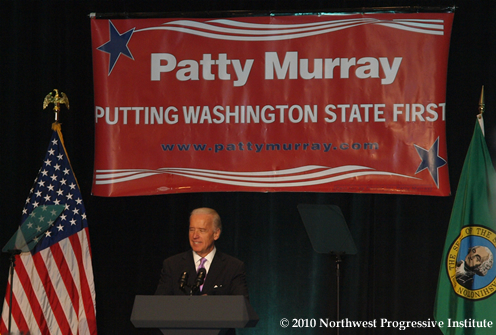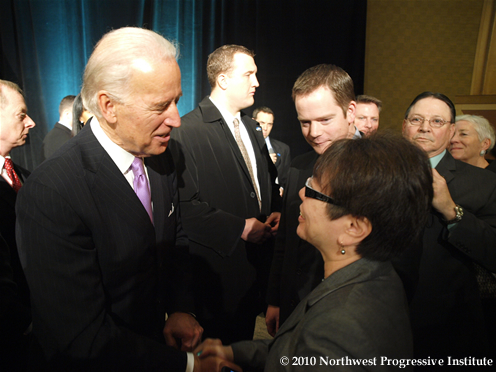Earlier this week, Washington's Democratically-controlled Legislature finally began moving towards amending
Tim Eyman's Initiative 960, which for the last two years has unconstitutionally outlawed majority rule from prevailing on fiscal decisions. Designed to allow the Republican caucuses in the House and Senate to wield veto power over the democratically elected Democratic majority, Initiative 960 has been on the books since it took effect early in December 2007.
Democrats have not had the ability to amend Initiative 960 until this legislative session because (ironically) the Constitution prohibits the Legislature from modifying initiatives after they have passed for two years. Now that that prohibition has expired, however, Democrats have the ability to neutralize this
undemocratic initiative and restore majority rule to our statehouse.
"I-960 in practice is an impenetrable roadblock to thoughtful, reasoned governing," declared State Representative Ross Hunter, the prime sponsor of a bill to raise revenue and repeal outdated tax exemptions (
HB 3176), which will move forward as soon as Tim Eyman's Initiative 960 has been amended.
"Not only does it keep us from making sensible fixes to our tax code, the 2/3 majority requirement leads to the worst kind of politicking and vote-trading, as witnessed in national efforts to pass health care reform, or in efforts to pass a budget in California where a 2/3 majority is required," Hunter added.
The Senate is taking the lead on amending Initiative 960, as agreed by Democratic legislative leaders. This afternoon the Senate Ways & Means Committee
held a public hearing on
SB 6843, which abolishes minority rule by amending I-960.
"I-960 is clearly unconstitutional. But the Supreme Court punted. They said the Legislature can fix it and that's what we're doing," Chair Margarita Prentice said.
Senator Prentice absolutely correct. We could have hardly said it better.
Tim Eyman, predictably, showed up to stomp his feet, wave his arms, call names, and throw a temper tantrum. And for good reason: his bluster is failing to deter Democratic legislators from thwarting his un-American, undemocratic assault on our cherished tradition of majority rule. Sadly, Eyman's temper tantrum is being echoed by people who should know better.
Like KOMO's Ken Schram, a quasi-libertarian who opposes Tim Eyman measures when they're on the ballot
but then turns around and claims that amending them would be violating the will of the people:
Democrats in the House and Senate have the legal authority to scrub 960 but I maintain they have the moral obligation not to.
It doesn't mean a tinkers dam whether I didn't vote for 960 or if it makes their jobs harder.
It's what the people of this state voted for.
Wrong. It's what the people of this state voted for
once upon a time. Since that election, the people have overwhelmingly voted down two Tim Eyman initiatives (I-985 in 2008, I-1033 in 2009), reelected Governor Chris Gregoire, and reelected the Legislature's Democratic majority in both houses to new terms in office.
Is Schram implying that the people spoke less clearly in those elections than in 2007, when Initiative 960 narrowly passed?
Let's not forget that 2007 was an off-year election with far lower turnout than either 2006 or 2008, when legislators stood for election.
Let's also not forget that in that same off-year election, besides narrowly voting to approve Initiative 960 (which took away majority rule) the people of the State of Washington also approved HJR 4204, which amended the State Constitution to allow school levies to pass by simple majority.
Initiative 960 might not have passed at all had voters understood that Initiative 960 would take away our cherished tradition of majority rule. The campaign against did not do a good job explaining the consequences.
But that's irrelevant.
What is relevant is this:
The people of the State of Washington, voting in an election, have no authority to take away the rights of the majority in another election. It's un-American and it's undemocratic.
Yet this is precisely what happened with Initiative 960. A majority in an off-year election narrowly approved the initiative. The following year, a larger majority affirmed Democratic control of the Legislature.
The Legislature did not have the option of raising revenue to offset budget cuts in last year's legislative session because I-960 was in the way. And they couldn't remove I-960 because the Constitution prevented them from doing so. (
Lisa Brown did go to court to try to have I-960 stricken,
but the Supreme Court chickened out and refused to rule on I-960's constitutionality.)
Now Initiative 960, which itself violates the State Constitution, is no longer protected by that sacred document. Consequently, Democrats are acting courageously to neutralize the initiative so Republicans no longer have the power to veto the will of the majority. Our common wealth is in grave danger and Democrats are acting to protect it from being further damaged.
Just today, a King County Superior Court judge
ruled that the state is failing to adequately provide for the education of young Washingtonians, as the State Constitution demands. That obligation is the state's "paramount duty", but for years the Legislature has passed the buck.
Now, at last, legislators are doing the responsible thing, and what thanks do they get? Nasty, derisive invective from the likes of Tim Eyman, perhaps the most irresponsible, greedy, self-centered, penny wise and pound foolish individual ever to live in the State of Washington, who, eight years ago to this day,
tearfully admitted to pocketing hundreds of thousands of dollars of his own supporters' money for personal profit and then lying about it.
No one in this state is more
unqualified to preach about fiscal responsibility than Tim Eyman. Eyman's backing singers - especially Seattle Times publisher Frank Blethen and his editorial writers - should be heartily ashamed of themselves
for not only supporting Initiative 960 in 2007, but for editorializing
in favor of keeping its shackles in place this legislative session.
Their reasoning is unsound and their abetting of Tim Eyman is disgraceful.
We live in a democracy. For democracy to work, the decisions of the majority must prevail. Anything else is tantamount to oligarchy, or rule by the few. The only decisions that a minority should ever be able to block are decisions that would take away minority rights. This is why we have a Constitution that cannot be easily changed. Our State Constitution was written to protect both majority rule and minority rights. Majority rule is explicitly mentioned in Article II, Section 22 which says that bills shall pass by majority vote.
Why is that language there?
Because the people who wrote that document foresaw, wisely, that at some point, somebody (like Tim Eyman) might propose changing the rules because he or she didn't like the decisions the Legislature was making.
So they put in the word majority. And what did they mean by majority? Fifty percent plus one. A supermajority is a majority, but a supermajority
requirement is a minority veto threshold. Not a majority.
If minority veto thresholds, such as the one contained in Initiative 960, are so wonderful, why don't Tim Eyman and The Seattle Times propose the same for any initiative that raises or lowers revenue? And, incidentally, why stop at two thirds? How about three fourths, or nine tenths? Think of that... nine tenths approval required for all of Tim Eyman's initiatives!
No Tim Eyman initiative has ever met such a threshold. In fact, no Tim Eyman initiative has ever met the threshold contained within Initiative 960. If we had a law that made it tougher to pass initiatives, all Tim Eyman initiatives would have failed at the ballot. Every last one.
Even Initiative 695.
If anybody even seriously proposed such a law, Tim Eyman would scream like a banshee. That's how much of a hypocrite he is.
Unlike Tim Eyman, our Democratic legislators have sworn or affirmed an oath to uphold the Constitution of our state. They have a moral obligation to strike Initiative 960's shackles and a moral obligation to govern wisely and justly. With our state in the midst of a recession and public services in danger of going bankrupt, they likewise have a moral obligation to raise revenue so that our common wealth remains strong. Our welfare and our future depend on their courage.






